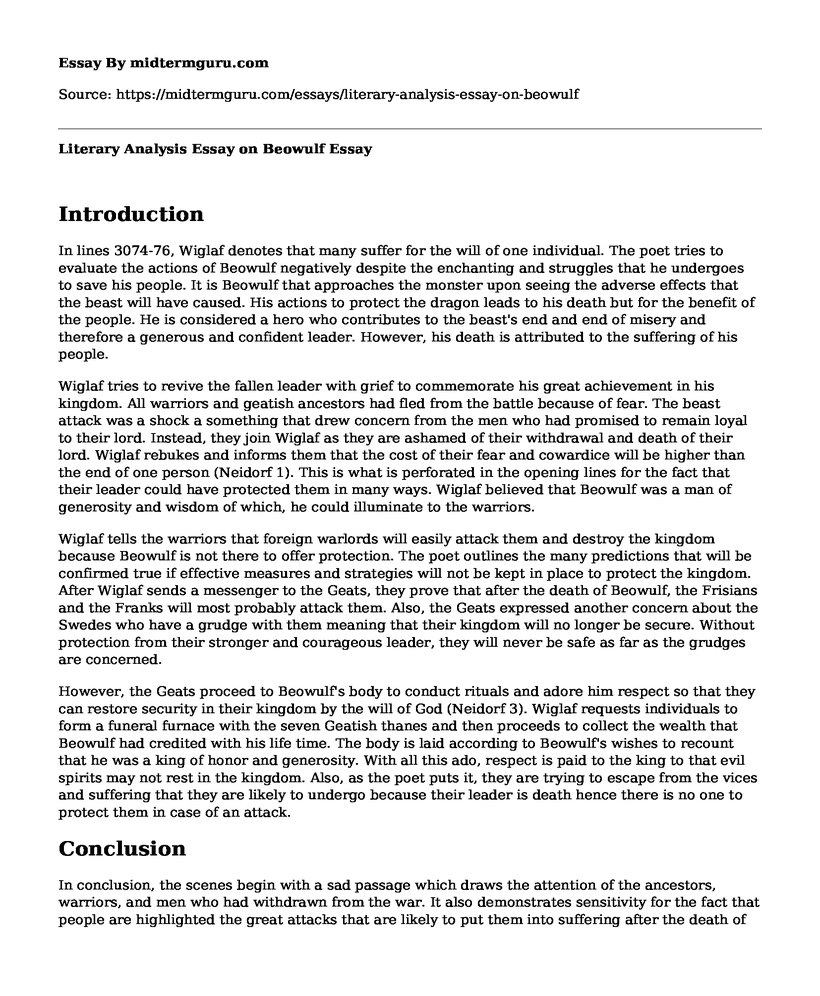Introduction
In lines 3074-76, Wiglaf denotes that many suffer for the will of one individual. The poet tries to evaluate the actions of Beowulf negatively despite the enchanting and struggles that he undergoes to save his people. It is Beowulf that approaches the monster upon seeing the adverse effects that the beast will have caused. His actions to protect the dragon leads to his death but for the benefit of the people. He is considered a hero who contributes to the beast's end and end of misery and therefore a generous and confident leader. However, his death is attributed to the suffering of his people.
Wiglaf tries to revive the fallen leader with grief to commemorate his great achievement in his kingdom. All warriors and geatish ancestors had fled from the battle because of fear. The beast attack was a shock a something that drew concern from the men who had promised to remain loyal to their lord. Instead, they join Wiglaf as they are ashamed of their withdrawal and death of their lord. Wiglaf rebukes and informs them that the cost of their fear and cowardice will be higher than the end of one person (Neidorf 1). This is what is perforated in the opening lines for the fact that their leader could have protected them in many ways. Wiglaf believed that Beowulf was a man of generosity and wisdom of which, he could illuminate to the warriors.
Wiglaf tells the warriors that foreign warlords will easily attack them and destroy the kingdom because Beowulf is not there to offer protection. The poet outlines the many predictions that will be confirmed true if effective measures and strategies will not be kept in place to protect the kingdom. After Wiglaf sends a messenger to the Geats, they prove that after the death of Beowulf, the Frisians and the Franks will most probably attack them. Also, the Geats expressed another concern about the Swedes who have a grudge with them meaning that their kingdom will no longer be secure. Without protection from their stronger and courageous leader, they will never be safe as far as the grudges are concerned.
However, the Geats proceed to Beowulf's body to conduct rituals and adore him respect so that they can restore security in their kingdom by the will of God (Neidorf 3). Wiglaf requests individuals to form a funeral furnace with the seven Geatish thanes and then proceeds to collect the wealth that Beowulf had credited with his life time. The body is laid according to Beowulf's wishes to recount that he was a king of honor and generosity. With all this ado, respect is paid to the king to that evil spirits may not rest in the kingdom. Also, as the poet puts it, they are trying to escape from the vices and suffering that they are likely to undergo because their leader is death hence there is no one to protect them in case of an attack.
Conclusion
In conclusion, the scenes begin with a sad passage which draws the attention of the ancestors, warriors, and men who had withdrawn from the war. It also demonstrates sensitivity for the fact that people are highlighted the great attacks that are likely to put them into suffering after the death of their leader. According to the poet, this nostalgic scene prepares the cowardice warriors and the people for the protection of their kingdom.
Works Cited
Neidorf, Leonard. "Dramatic Irony and Pagan Salvation in Beowulf." ANQ: A Quarterly Journal of Short Articles, Notes, and Reviews (2018): 1-3.
Cite this page
Literary Analysis Essay on Beowulf. (2022, Sep 11). Retrieved from https://midtermguru.com/essays/literary-analysis-essay-on-beowulf
If you are the original author of this essay and no longer wish to have it published on the midtermguru.com website, please click below to request its removal:
- The Invisible Man by Ralph Ellison Review Sample
- Oscar Wilde: Disobedience Is a Valuable Human Trait
- Essay About Lincoln Steffens
- Short Story Thematic Analysis: The New Dress and Open Road Media - Literature Paper Example
- Essay on Hemingways Soldiers Home and Big Two-Heated River
- My research topic is: Maintaining Academic integrity among undergraduate students
- Character Analysis Essay on Romeo as a Tragic Hero







